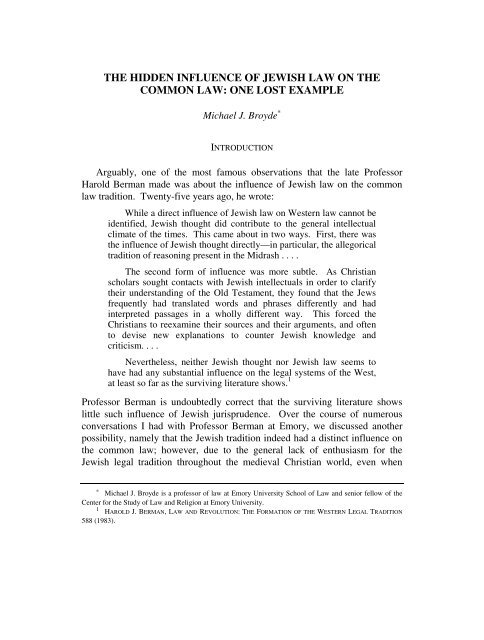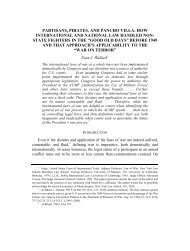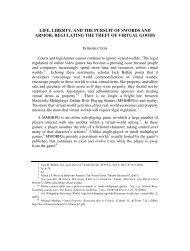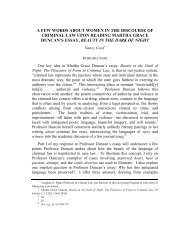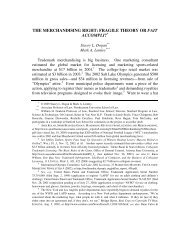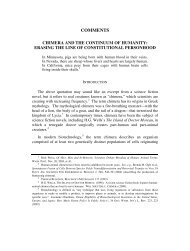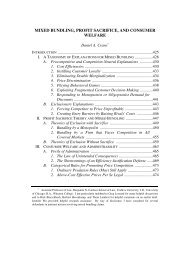The Hidden Influence of Jewish Law on the - Emory University ...
The Hidden Influence of Jewish Law on the - Emory University ...
The Hidden Influence of Jewish Law on the - Emory University ...
Create successful ePaper yourself
Turn your PDF publications into a flip-book with our unique Google optimized e-Paper software.
THE HIDDEN INFLUENCE OF JEWISH LAW ON THE<br />
COMMON LAW: ONE LOST EXAMPLE<br />
Michael J. Broyde ∗<br />
INTRODUCTION<br />
Arguably, <strong>on</strong>e <str<strong>on</strong>g>of</str<strong>on</strong>g> <strong>the</strong> most famous observati<strong>on</strong>s that <strong>the</strong> late Pr<str<strong>on</strong>g>of</str<strong>on</strong>g>essor<br />
Harold Berman made was about <strong>the</strong> influence <str<strong>on</strong>g>of</str<strong>on</strong>g> <str<strong>on</strong>g>Jewish</str<strong>on</strong>g> law <strong>on</strong> <strong>the</strong> comm<strong>on</strong><br />
law traditi<strong>on</strong>. Twenty-five years ago, he wrote:<br />
While a direct influence <str<strong>on</strong>g>of</str<strong>on</strong>g> <str<strong>on</strong>g>Jewish</str<strong>on</strong>g> law <strong>on</strong> Western law cannot be<br />
identified, <str<strong>on</strong>g>Jewish</str<strong>on</strong>g> thought did c<strong>on</strong>tribute to <strong>the</strong> general intellectual<br />
climate <str<strong>on</strong>g>of</str<strong>on</strong>g> <strong>the</strong> times. This came about in two ways. First, <strong>the</strong>re was<br />
<strong>the</strong> influence <str<strong>on</strong>g>of</str<strong>on</strong>g> <str<strong>on</strong>g>Jewish</str<strong>on</strong>g> thought directly—in particular, <strong>the</strong> allegorical<br />
traditi<strong>on</strong> <str<strong>on</strong>g>of</str<strong>on</strong>g> reas<strong>on</strong>ing present in <strong>the</strong> Midrash . . . .<br />
<str<strong>on</strong>g>The</str<strong>on</strong>g> sec<strong>on</strong>d form <str<strong>on</strong>g>of</str<strong>on</strong>g> influence was more subtle. As Christian<br />
scholars sought c<strong>on</strong>tacts with <str<strong>on</strong>g>Jewish</str<strong>on</strong>g> intellectuals in order to clarify<br />
<strong>the</strong>ir understanding <str<strong>on</strong>g>of</str<strong>on</strong>g> <strong>the</strong> Old Testament, <strong>the</strong>y found that <strong>the</strong> Jews<br />
frequently had translated words and phrases differently and had<br />
interpreted passages in a wholly different way. This forced <strong>the</strong><br />
Christians to reexamine <strong>the</strong>ir sources and <strong>the</strong>ir arguments, and <str<strong>on</strong>g>of</str<strong>on</strong>g>ten<br />
to devise new explanati<strong>on</strong>s to counter <str<strong>on</strong>g>Jewish</str<strong>on</strong>g> knowledge and<br />
criticism. . . .<br />
Never<strong>the</strong>less, nei<strong>the</strong>r <str<strong>on</strong>g>Jewish</str<strong>on</strong>g> thought nor <str<strong>on</strong>g>Jewish</str<strong>on</strong>g> law seems to<br />
have had any substantial influence <strong>on</strong> <strong>the</strong> legal systems <str<strong>on</strong>g>of</str<strong>on</strong>g> <strong>the</strong> West,<br />
at least so far as <strong>the</strong> surviving literature shows. 1<br />
Pr<str<strong>on</strong>g>of</str<strong>on</strong>g>essor Berman is undoubtedly correct that <strong>the</strong> surviving literature shows<br />
little such influence <str<strong>on</strong>g>of</str<strong>on</strong>g> <str<strong>on</strong>g>Jewish</str<strong>on</strong>g> jurisprudence. Over <strong>the</strong> course <str<strong>on</strong>g>of</str<strong>on</strong>g> numerous<br />
c<strong>on</strong>versati<strong>on</strong>s I had with Pr<str<strong>on</strong>g>of</str<strong>on</strong>g>essor Berman at <strong>Emory</strong>, we discussed ano<strong>the</strong>r<br />
possibility, namely that <strong>the</strong> <str<strong>on</strong>g>Jewish</str<strong>on</strong>g> traditi<strong>on</strong> indeed had a distinct influence <strong>on</strong><br />
<strong>the</strong> comm<strong>on</strong> law; however, due to <strong>the</strong> general lack <str<strong>on</strong>g>of</str<strong>on</strong>g> enthusiasm for <strong>the</strong><br />
<str<strong>on</strong>g>Jewish</str<strong>on</strong>g> legal traditi<strong>on</strong> throughout <strong>the</strong> medieval Christian world, even when<br />
∗ Michael J. Broyde is a pr<str<strong>on</strong>g>of</str<strong>on</strong>g>essor <str<strong>on</strong>g>of</str<strong>on</strong>g> law at <strong>Emory</strong> <strong>University</strong> School <str<strong>on</strong>g>of</str<strong>on</strong>g> <str<strong>on</strong>g>Law</str<strong>on</strong>g> and senior fellow <str<strong>on</strong>g>of</str<strong>on</strong>g> <strong>the</strong><br />
Center for <strong>the</strong> Study <str<strong>on</strong>g>of</str<strong>on</strong>g> <str<strong>on</strong>g>Law</str<strong>on</strong>g> and Religi<strong>on</strong> at <strong>Emory</strong> <strong>University</strong>.<br />
1<br />
HAROLD J. BERMAN, LAW AND REVOLUTION: THE FORMATION OF THE WESTERN LEGAL TRADITION<br />
588 (1983).
1404 EMORY LAW JOURNAL [Vol. 57<br />
<str<strong>on</strong>g>Jewish</str<strong>on</strong>g> sources were c<strong>on</strong>sulted, <strong>the</strong>y were not cited. I wish to show what I<br />
think is <strong>on</strong>e such example—<strong>the</strong> enigmatic origins <str<strong>on</strong>g>of</str<strong>on</strong>g> <strong>the</strong> comm<strong>on</strong> law rule that<br />
<strong>the</strong> holder <str<strong>on</strong>g>of</str<strong>on</strong>g> lost property might be a bailee for hire and not a gratuitous<br />
bailee.<br />
<str<strong>on</strong>g>The</str<strong>on</strong>g> Holder <str<strong>on</strong>g>of</str<strong>on</strong>g> Lost Property as a Bailee<br />
One who picks up a lost object prior to aband<strong>on</strong>ment does not take<br />
complete title to <strong>the</strong> object according to both <str<strong>on</strong>g>Jewish</str<strong>on</strong>g> and comm<strong>on</strong> law. 2<br />
Ra<strong>the</strong>r, a bailment is created as <strong>the</strong> finder is entrusted to hold <strong>the</strong> property for<br />
its true owner. But what type <str<strong>on</strong>g>of</str<strong>on</strong>g> bailment is created, and with what level <str<strong>on</strong>g>of</str<strong>on</strong>g><br />
liability? In general, <str<strong>on</strong>g>Jewish</str<strong>on</strong>g> law recognizes essentially three categories <str<strong>on</strong>g>of</str<strong>on</strong>g><br />
bailment, each with varying degrees <str<strong>on</strong>g>of</str<strong>on</strong>g> resp<strong>on</strong>sibility: (1) <strong>the</strong> gratuitous bailee,<br />
who is liable <strong>on</strong>ly for outright negligence; (2) <strong>the</strong> bailee for hire, who is also<br />
liable for <strong>the</strong>ft or loss; and (3) <str<strong>on</strong>g>The</str<strong>on</strong>g> borrower, who is virtually an insurer, and<br />
liable for almost all mishaps which may befall <strong>the</strong> article. 3<br />
Similarly, although <strong>the</strong> comm<strong>on</strong> law traditi<strong>on</strong> has a number <str<strong>on</strong>g>of</str<strong>on</strong>g> terms to<br />
describe various scenarios in which <strong>on</strong>e is entrusted with <strong>the</strong> property <str<strong>on</strong>g>of</str<strong>on</strong>g><br />
ano<strong>the</strong>r, it essentially recognizes three categories <str<strong>on</strong>g>of</str<strong>on</strong>g> bailments (excluding<br />
excepti<strong>on</strong>al obligati<strong>on</strong>s created by law): (1) gratuitous bailments for <strong>the</strong><br />
bailor’s sole benefit (e.g., <strong>the</strong> unpaid watchman); (2) gratuitous bailments for<br />
<strong>the</strong> bailee’s sole benefit (e.g., <strong>the</strong> borrower); and (3) bailments for mutual<br />
benefit (including <strong>the</strong> watchman for hire and <strong>the</strong> renter). 4 <str<strong>on</strong>g>The</str<strong>on</strong>g> rights and<br />
resp<strong>on</strong>sibilities <str<strong>on</strong>g>of</str<strong>on</strong>g> <strong>the</strong> bailee in each <str<strong>on</strong>g>of</str<strong>on</strong>g> <strong>the</strong>se categories—including liability for<br />
<strong>the</strong> object in questi<strong>on</strong>—though different from <str<strong>on</strong>g>Jewish</str<strong>on</strong>g> law, likewise vary by<br />
classificati<strong>on</strong>. Clearly in <strong>the</strong> case <str<strong>on</strong>g>of</str<strong>on</strong>g> holding <strong>on</strong> to lost property, <strong>the</strong> bailment<br />
is not to <strong>the</strong> sole benefit <str<strong>on</strong>g>of</str<strong>on</strong>g> <strong>the</strong> finder. But what <str<strong>on</strong>g>of</str<strong>on</strong>g> <strong>the</strong> remaining two<br />
categories—is <strong>the</strong> bailment created a very limited bailment, like a gratuitous<br />
bailee, or is it <strong>the</strong> more rigorous bailment for hire?<br />
<str<strong>on</strong>g>The</str<strong>on</strong>g> <str<strong>on</strong>g>Jewish</str<strong>on</strong>g> <str<strong>on</strong>g>Law</str<strong>on</strong>g><br />
<str<strong>on</strong>g>The</str<strong>on</strong>g> Talmud cites two opini<strong>on</strong>s c<strong>on</strong>cerning <strong>the</strong> category <str<strong>on</strong>g>of</str<strong>on</strong>g> bailment created<br />
when <strong>on</strong>e finds lost property and holds it for its true owner. <str<strong>on</strong>g>The</str<strong>on</strong>g> Talmud<br />
2 See Michael J. Broyde & Michael Hecht, <str<strong>on</strong>g>The</str<strong>on</strong>g> Return <str<strong>on</strong>g>of</str<strong>on</strong>g> Lost Property According to <str<strong>on</strong>g>Jewish</str<strong>on</strong>g> & Comm<strong>on</strong><br />
<str<strong>on</strong>g>Law</str<strong>on</strong>g>: A Comparis<strong>on</strong>, 12 J.L. & RELIGION 225, 239–41 (1995–96).<br />
3<br />
BAVA MEZIA 93a; Moses Maim<strong>on</strong>ides, MISHNEH TORAH, Hiring [<str<strong>on</strong>g>of</str<strong>on</strong>g> Workers], 1:1–2.<br />
4 19 SAMUEL WILLISTON & RICHARD A. LORD, A TREATISE ON THE LAW OF CONTRACTS § 53:3 (4th ed.<br />
2001).
2008] INFLUENCE OF JEWISH LAW ON COMMON LAW 1405<br />
states: “A bailee <str<strong>on</strong>g>of</str<strong>on</strong>g> lost property: Rabbah ruled that he is a gratuitous bailee;<br />
Rabbi Joseph maintained that he was a bailee-for-hire.” 5 It is unclear which <str<strong>on</strong>g>of</str<strong>on</strong>g><br />
<strong>the</strong>se two opini<strong>on</strong>s <str<strong>on</strong>g>Jewish</str<strong>on</strong>g> law accepts as normative. Many early authorities,<br />
including Maim<strong>on</strong>ides and Joseph Karo, author <str<strong>on</strong>g>of</str<strong>on</strong>g> <strong>the</strong> Shulhan Arukh, rule in<br />
accordance with <strong>the</strong> opini<strong>on</strong> <str<strong>on</strong>g>of</str<strong>on</strong>g> Rabbi Joseph and <strong>the</strong>refore hold <strong>the</strong> finder<br />
resp<strong>on</strong>sible not <strong>on</strong>ly for negligence but also <strong>the</strong>ft or loss not attributable to<br />
negligence. 6 Many o<strong>the</strong>r authorities, including Rabbi Moses Isserles, accept<br />
<strong>the</strong> opini<strong>on</strong> <str<strong>on</strong>g>of</str<strong>on</strong>g> Rabbah and rule that <strong>the</strong> finder <strong>on</strong>ly has <strong>the</strong> status <str<strong>on</strong>g>of</str<strong>on</strong>g> a<br />
gratuitous bailee and is liable <strong>on</strong>ly for his negligence. 7 This dispute remains<br />
unresolved in <str<strong>on</strong>g>Jewish</str<strong>on</strong>g> law. 8<br />
At this point we should note that while nearly all <str<strong>on</strong>g>of</str<strong>on</strong>g> <strong>the</strong>se works <str<strong>on</strong>g>of</str<strong>on</strong>g> <str<strong>on</strong>g>Jewish</str<strong>on</strong>g><br />
law were generally unavailable to those who did not read Hebrew in premodern<br />
times, Maim<strong>on</strong>ides’ Mishneh Torah had been translated into Latin. 9<br />
And Maim<strong>on</strong>ides unequivocally rules that <strong>the</strong> holder <str<strong>on</strong>g>of</str<strong>on</strong>g> lost property is a<br />
bailee-for-hire. Admittedly, <strong>the</strong> opini<strong>on</strong> classifying <strong>the</strong> finder as a bailee-forhire<br />
requires explanati<strong>on</strong>. Why should a pers<strong>on</strong> who is involuntarily returning<br />
lost property assume <strong>the</strong> status <str<strong>on</strong>g>of</str<strong>on</strong>g> a paid bailee? <str<strong>on</strong>g>The</str<strong>on</strong>g> Talmudic Rabbi Joseph 10<br />
renders his opini<strong>on</strong> based <strong>on</strong> an overtly religious doctrine that, while <strong>on</strong>e is<br />
engaged in <strong>the</strong> actual performance <str<strong>on</strong>g>of</str<strong>on</strong>g> a legally compulsory religious duty, <strong>on</strong>e<br />
is excused from o<strong>the</strong>r legal obligati<strong>on</strong>s, including financial obligati<strong>on</strong>s. Thus,<br />
Rabbi Joseph recounts that if perchance while <strong>the</strong> bailee was attending to <strong>the</strong><br />
lost article for <strong>the</strong> owner’s benefit 11 —a legally compulsory duty—a poor man<br />
came for a charitable d<strong>on</strong>ati<strong>on</strong>, <strong>on</strong>e would be excused from giving him charity,<br />
and such charity is o<strong>the</strong>rwise mandatory. 12<br />
5<br />
BAVA MEZIA 29a; cf. BAVA KAMA 56b.<br />
6 Moses Maim<strong>on</strong>ides, MISHNEH TORAH, <str<strong>on</strong>g>The</str<strong>on</strong>g>ft and Aband<strong>on</strong>ment 13:10; Joseph Karo, SHULHAN ARUKH,<br />
HOSHEN MISHPAT 267:16.<br />
7<br />
SHULHAN ARUKH, HOSHEN MISHPAT 267:16.<br />
8 Both Joshua Falk-Cohen (Sema) and Shabtai ben Meir HaCohen (Shakh) label this dispute as a case <str<strong>on</strong>g>of</str<strong>on</strong>g> legal<br />
doubt.<br />
9 See Görge K. Hasselh<str<strong>on</strong>g>of</str<strong>on</strong>g>f, Maim<strong>on</strong>ides in <strong>the</strong> Latin Middle Ages: An Introductory Survey, 9 JEWISH<br />
STUD. Q. 1 (2002).<br />
10<br />
BAVA KAMA 56b.<br />
11 Obviously <strong>the</strong> mere fact that <strong>the</strong> object is in <strong>the</strong> finder’s possessi<strong>on</strong> does not c<strong>on</strong>stitute involvement in a<br />
mitzvah (esek be-mitzvah). <str<strong>on</strong>g>The</str<strong>on</strong>g> bailee must actually be involved in preserving <strong>the</strong> object. See TOSAFOT, BAVA<br />
KAMA 56b, s.v. behahi hana’ah.<br />
12 Providing charity for a pers<strong>on</strong>’s daily food needs is mandatory in <str<strong>on</strong>g>Jewish</str<strong>on</strong>g> law. See SHULHAN ARUKH,<br />
YOREH DEAH 250:1. It is worth noting that <strong>the</strong> Talmud, BAVA KAMA 56b, seems to <str<strong>on</strong>g>of</str<strong>on</strong>g>fer an alternative rati<strong>on</strong>ale for<br />
Rabbi Joseph, namely that <strong>the</strong> finder is c<strong>on</strong>sidered a bailee for hire because Divine <str<strong>on</strong>g>Law</str<strong>on</strong>g> imposes against <strong>on</strong>e’s will<br />
<strong>the</strong> obligati<strong>on</strong> to pick up lost objects. In this explicati<strong>on</strong> <str<strong>on</strong>g>of</str<strong>on</strong>g> Rabbi Joseph’s view, <strong>on</strong>e’s religious obligati<strong>on</strong> to<br />
pick up lost items generates resp<strong>on</strong>sibilities to <strong>the</strong> found object above and bey<strong>on</strong>d <strong>the</strong> care due to all property<br />
<strong>on</strong>e does not own (i.e., merely to avoid negligence, <strong>the</strong> same duty incumbent up<strong>on</strong> a gratuitous bailee, who
1406 EMORY LAW JOURNAL [Vol. 57<br />
<str<strong>on</strong>g>The</str<strong>on</strong>g> bailee’s involvement in attending to a lost object exempts him from<br />
attending to <strong>the</strong> poor man (which would o<strong>the</strong>rwise be obligatory), <strong>the</strong>reby<br />
allowing <strong>the</strong> returner <str<strong>on</strong>g>of</str<strong>on</strong>g> lost property to derive a clear financial benefit from<br />
his acti<strong>on</strong>; such a benefit qualifies as a payment. This financial benefit,<br />
according to Rabbi Joseph, is itself sufficient to classify <strong>the</strong> finder <str<strong>on</strong>g>of</str<strong>on</strong>g> lost<br />
property as a bailee-for-hire, since he can derive financial benefit from his<br />
bailment. 13 This outcome is unlikely, however, and that is why some<br />
authorities accept <strong>the</strong> opini<strong>on</strong> <str<strong>on</strong>g>of</str<strong>on</strong>g> Rabbah and rule that, since <strong>the</strong> financial gain<br />
is sufficiently remote, a finder should better be classified as a gratuitous bailee.<br />
As a matter <str<strong>on</strong>g>of</str<strong>on</strong>g> <str<strong>on</strong>g>Jewish</str<strong>on</strong>g> law, with its almost unique mixture <str<strong>on</strong>g>of</str<strong>on</strong>g> law and religi<strong>on</strong>,<br />
this dispute makes sense. But it does not easily map <strong>on</strong>to native comm<strong>on</strong> law<br />
principles.<br />
<str<strong>on</strong>g>The</str<strong>on</strong>g> Comm<strong>on</strong> <str<strong>on</strong>g>Law</str<strong>on</strong>g> Traditi<strong>on</strong><br />
This exact dispute as to <strong>the</strong> status <str<strong>on</strong>g>of</str<strong>on</strong>g> <strong>the</strong> finder <str<strong>on</strong>g>of</str<strong>on</strong>g> lost property occurs in <strong>the</strong><br />
comm<strong>on</strong> law. As <strong>on</strong>e legal encyclopedia states:<br />
<str<strong>on</strong>g>The</str<strong>on</strong>g> finder <str<strong>on</strong>g>of</str<strong>on</strong>g> lost property who takes possessi<strong>on</strong> <str<strong>on</strong>g>of</str<strong>on</strong>g> it assumes <strong>the</strong><br />
duties <str<strong>on</strong>g>of</str<strong>on</strong>g> a bailee without compensati<strong>on</strong>, although <strong>the</strong>re is also<br />
authority that <strong>the</strong> finder is a bailee for hire. 14<br />
However, in comm<strong>on</strong> law <strong>the</strong> prevailing view is that <strong>the</strong> finder is a gratuitous<br />
bailee, with <strong>on</strong>ly a minority <str<strong>on</strong>g>of</str<strong>on</strong>g> authorities accepting <strong>the</strong> bailee for hire rule. 15<br />
But this dispute makes no sense in <strong>the</strong> comm<strong>on</strong> law. Unlike <str<strong>on</strong>g>Jewish</str<strong>on</strong>g> law, which<br />
mandates that <strong>on</strong>e pick <str<strong>on</strong>g>of</str<strong>on</strong>g> a lost object when <strong>on</strong>e sees it, and unlike <str<strong>on</strong>g>Jewish</str<strong>on</strong>g> law<br />
which mandates <strong>the</strong> giving <str<strong>on</strong>g>of</str<strong>on</strong>g> charity in certain situati<strong>on</strong>s, <strong>the</strong> comm<strong>on</strong> law has<br />
no basis for explaining why <strong>on</strong>e might c<strong>on</strong>sider <strong>the</strong> pers<strong>on</strong> who picks up a lost<br />
object to be a bailee for hire. Indeed, when <strong>on</strong>e looks in <strong>the</strong> classical works <str<strong>on</strong>g>of</str<strong>on</strong>g><br />
<strong>the</strong> historic comm<strong>on</strong> law, <strong>on</strong>e sees that <strong>the</strong> commentators <strong>on</strong> <strong>the</strong> comm<strong>on</strong> law<br />
fundamentally is not a bailee at all as every<strong>on</strong>e is required to exercise this minimum level <str<strong>on</strong>g>of</str<strong>on</strong>g> care for o<strong>the</strong>rs’<br />
property). Rabbah would disagree with this as well, viewing <strong>the</strong> property in <strong>the</strong> finder’s possessi<strong>on</strong> as no<br />
different from an object left <strong>on</strong> any<strong>on</strong>e’s property by a stranger (heftsekha bimekomi), due no (extraordinary)<br />
care o<strong>the</strong>r than <strong>the</strong> avoidance <str<strong>on</strong>g>of</str<strong>on</strong>g> negligence.<br />
13 This distant definiti<strong>on</strong> <str<strong>on</strong>g>of</str<strong>on</strong>g> benefit is not foreign to American law. Frequently, <strong>the</strong> law defines even a very<br />
tangential <strong>the</strong>oretical benefit as sufficient to be classified as a benefit as a matter <str<strong>on</strong>g>of</str<strong>on</strong>g> law. See, e.g., D<strong>on</strong>ovan v.<br />
Bierwirth, 680 F.2d 263 (2d Cir. 1982) (holding that, for <strong>the</strong> purposes ERISA law, a benefit encompasses even<br />
situati<strong>on</strong>s where <strong>the</strong>re is no apparent real financial benefit).<br />
14 36A C.J.S. Finding Lost Goods § 8 & nn.13–15 (2008) (emphasis added, footnotes omitted).<br />
15 See, e.g., RAY ANDREWS BROWN & WALTER R. RAUSHENBUSH, THE LAW OF PERSONAL PROPERTY § 3.5<br />
(3d ed. 1975); 36A C.J.S. Finding Lost Goods § 8 (2008).
2008] INFLUENCE OF JEWISH LAW ON COMMON LAW 1407<br />
were equally befuddled by this mystery. 16 Why should <strong>the</strong> comm<strong>on</strong> law ever<br />
burden <strong>the</strong> voluntary holder <str<strong>on</strong>g>of</str<strong>on</strong>g> lost property with <strong>the</strong> status <str<strong>on</strong>g>of</str<strong>on</strong>g> a bailee for hire?<br />
<str<strong>on</strong>g>The</str<strong>on</strong>g>re is no good answer to this questi<strong>on</strong>.<br />
All things c<strong>on</strong>sidered, I think that <strong>the</strong> answer is <strong>the</strong> influence <str<strong>on</strong>g>of</str<strong>on</strong>g><br />
Maim<strong>on</strong>ides <strong>on</strong> <strong>the</strong> comm<strong>on</strong> law. <str<strong>on</strong>g>The</str<strong>on</strong>g> great early writers <str<strong>on</strong>g>of</str<strong>on</strong>g> <strong>the</strong> comm<strong>on</strong> law<br />
had Maim<strong>on</strong>ides’ code <str<strong>on</strong>g>of</str<strong>on</strong>g> <str<strong>on</strong>g>Jewish</str<strong>on</strong>g> law in fr<strong>on</strong>t <str<strong>on</strong>g>of</str<strong>on</strong>g> <strong>the</strong>m in Latin translati<strong>on</strong>, and<br />
Maim<strong>on</strong>ides clearly rules that <strong>the</strong> finder <str<strong>on</strong>g>of</str<strong>on</strong>g> lost property is a bailee for hire.<br />
Since Maim<strong>on</strong>ides provides no reas<strong>on</strong>ing for <strong>the</strong> black-letter law in his code,<br />
<strong>the</strong>re was nothing to indicate to <strong>the</strong> great codifiers <str<strong>on</strong>g>of</str<strong>on</strong>g> <strong>the</strong> comm<strong>on</strong> law that this<br />
was <strong>on</strong>e <str<strong>on</strong>g>of</str<strong>on</strong>g> <strong>the</strong> instances where <strong>the</strong> commercial law in <strong>the</strong> <str<strong>on</strong>g>Jewish</str<strong>on</strong>g> traditi<strong>on</strong> was<br />
influenced by its religious values, and Maim<strong>on</strong>ides’ rule was incorporated into<br />
<strong>the</strong> comm<strong>on</strong> law as <strong>on</strong>e possibility. Of course, as was <strong>the</strong> style <str<strong>on</strong>g>of</str<strong>on</strong>g> <strong>the</strong> day,<br />
Maim<strong>on</strong>ides was not cited—but yet, it is quite reas<strong>on</strong>able to suppose that an<br />
o<strong>the</strong>rwise absolutely inexplicable enigma in <strong>the</strong> comm<strong>on</strong> law could well be<br />
explained by reference to <strong>the</strong> medieval <str<strong>on</strong>g>Jewish</str<strong>on</strong>g> law treatise readily available to<br />
<strong>the</strong> codifiers <str<strong>on</strong>g>of</str<strong>on</strong>g> <strong>the</strong> comm<strong>on</strong> law, such as <strong>the</strong> eminent legal scholar and jurist<br />
John Selden, who o<strong>the</strong>rs have noted sometimes made even direct use <str<strong>on</strong>g>of</str<strong>on</strong>g> <str<strong>on</strong>g>Jewish</str<strong>on</strong>g><br />
law and whose scholarship was replete with influences <str<strong>on</strong>g>of</str<strong>on</strong>g> <str<strong>on</strong>g>Jewish</str<strong>on</strong>g> law. 17<br />
CONCLUSION<br />
Lacking skills as a legal historian—yet ano<strong>the</strong>r skill Pr<str<strong>on</strong>g>of</str<strong>on</strong>g>essor Berman<br />
seemed to have acquired with ease—I am not sufficiently well-trained to prove<br />
that <strong>the</strong> comm<strong>on</strong> law was, in fact, influenced by <str<strong>on</strong>g>Jewish</str<strong>on</strong>g> law in its analysis <str<strong>on</strong>g>of</str<strong>on</strong>g><br />
this area, ra<strong>the</strong>r than merely evolving in <strong>the</strong> same way as a matter <str<strong>on</strong>g>of</str<strong>on</strong>g><br />
unexplainable coincidence. However, <strong>the</strong> comm<strong>on</strong> law rule that <strong>the</strong> finder<br />
assumes <strong>the</strong> duties <str<strong>on</strong>g>of</str<strong>on</strong>g> a bailee for hire seems impossible to explain within <strong>the</strong><br />
comm<strong>on</strong> law traditi<strong>on</strong>. 18 It would not come as a surprise to me if this were but<br />
16 See R.H. Helmholz, Equitable Divisi<strong>on</strong> and <strong>the</strong> <str<strong>on</strong>g>Law</str<strong>on</strong>g> <str<strong>on</strong>g>of</str<strong>on</strong>g> Finders, 52 FORDHAM L. REV. 313 (1983);<br />
Comment, Lost, Mislaid, and Aband<strong>on</strong>ed Property, 8 FORDHAM L. REV. 222 (1939).<br />
17 See Isaac Herzog, John Selden and <str<strong>on</strong>g>Jewish</str<strong>on</strong>g> <str<strong>on</strong>g>Law</str<strong>on</strong>g>, 13 J. COMP. LEGIS. & INT’L L. 236, 236–45 (1931).<br />
Herzog went <strong>on</strong> to become <strong>the</strong> first Chief Rabbi <str<strong>on</strong>g>of</str<strong>on</strong>g> Israel.<br />
18 In Michael Broyde & Michael Hecht, <str<strong>on</strong>g>The</str<strong>on</strong>g> Return <str<strong>on</strong>g>of</str<strong>on</strong>g> Lost Property According to <str<strong>on</strong>g>Jewish</str<strong>on</strong>g> & Comm<strong>on</strong><br />
<str<strong>on</strong>g>Law</str<strong>on</strong>g>: A Comparis<strong>on</strong>, 12 J. L. & RELIGION 225, 244 (1996), I speculated that <strong>the</strong> answer to this questi<strong>on</strong> is<br />
different. I wrote,<br />
On <strong>the</strong> o<strong>the</strong>r hand, <strong>the</strong>re is a reas<strong>on</strong>able chance that <strong>the</strong> finder will derive a m<strong>on</strong>etary benefit<br />
from his acti<strong>on</strong>s, since if <strong>the</strong> true owner does not come forward, <strong>the</strong> finder stands to gain use <str<strong>on</strong>g>of</str<strong>on</strong>g><br />
<strong>the</strong> property rent free. Thus <strong>on</strong>e could classify him as a bailee for hire, since he is seeking to<br />
rescue <strong>the</strong> property with <strong>the</strong> hope <str<strong>on</strong>g>of</str<strong>on</strong>g> using it.
1408 EMORY LAW JOURNAL [Vol. 57<br />
<strong>on</strong>e <str<strong>on</strong>g>of</str<strong>on</strong>g> many examples <str<strong>on</strong>g>of</str<strong>on</strong>g> a hidden <str<strong>on</strong>g>Jewish</str<strong>on</strong>g> law influence <strong>on</strong> <strong>the</strong> comm<strong>on</strong> law,<br />
nor would this be <strong>the</strong> first time such an influence has been shown. 19<br />
Indeed, Pr<str<strong>on</strong>g>of</str<strong>on</strong>g>essor Berman’s wisdom can be seen even in his careful choice<br />
<str<strong>on</strong>g>of</str<strong>on</strong>g> words to describe <strong>the</strong> known influence <str<strong>on</strong>g>of</str<strong>on</strong>g> <str<strong>on</strong>g>Jewish</str<strong>on</strong>g> law <strong>on</strong> <strong>the</strong> comm<strong>on</strong> law.<br />
When he states “nei<strong>the</strong>r <str<strong>on</strong>g>Jewish</str<strong>on</strong>g> thought nor <str<strong>on</strong>g>Jewish</str<strong>on</strong>g> law seems to have had any<br />
substantial influence <strong>on</strong> <strong>the</strong> legal systems <str<strong>on</strong>g>of</str<strong>on</strong>g> <strong>the</strong> West, at least so far as <strong>the</strong><br />
surviving literature shows,” it might well turn out that this final clause marks<br />
his pr<str<strong>on</strong>g>of</str<strong>on</strong>g>ound c<strong>on</strong>tributi<strong>on</strong> to this field <str<strong>on</strong>g>of</str<strong>on</strong>g> inquiry, inspiring scholarship to<br />
present a more complete understanding <str<strong>on</strong>g>of</str<strong>on</strong>g> <strong>the</strong> impact <str<strong>on</strong>g>of</str<strong>on</strong>g> <str<strong>on</strong>g>Jewish</str<strong>on</strong>g> law <strong>on</strong> <strong>the</strong><br />
comm<strong>on</strong> law traditi<strong>on</strong>.<br />
Such is <strong>the</strong> mark <str<strong>on</strong>g>of</str<strong>on</strong>g> a true scholar.<br />
Id. This may well be a fine explanati<strong>on</strong> for <str<strong>on</strong>g>Jewish</str<strong>on</strong>g> law, but at its core <strong>the</strong> comm<strong>on</strong> law cannot recognize this<br />
answer as correct since such a taking is illicit as a matter <str<strong>on</strong>g>of</str<strong>on</strong>g> comm<strong>on</strong> law. Pr<str<strong>on</strong>g>of</str<strong>on</strong>g>essor Berman noted to me<br />
many years ago that I must have been c<strong>on</strong>fusing <str<strong>on</strong>g>Jewish</str<strong>on</strong>g> law and comm<strong>on</strong> law when I wrote this sentence, and<br />
he was correct.<br />
19 See Judith A. Shapiro, Note, <str<strong>on</strong>g>The</str<strong>on</strong>g> Shetar’s Effect <strong>on</strong> English <str<strong>on</strong>g>Law</str<strong>on</strong>g>—A <str<strong>on</strong>g>Law</str<strong>on</strong>g> <str<strong>on</strong>g>of</str<strong>on</strong>g> <strong>the</strong> Jews Becomes <strong>the</strong> <str<strong>on</strong>g>Law</str<strong>on</strong>g><br />
<str<strong>on</strong>g>of</str<strong>on</strong>g> <strong>the</strong> Land, 71 GEO. L.J. 1179 (1983); Isaac Braz, <str<strong>on</strong>g>The</str<strong>on</strong>g> Privilege Against Self-Incriminati<strong>on</strong> in Anglo-<br />
American <str<strong>on</strong>g>Law</str<strong>on</strong>g>: <str<strong>on</strong>g>The</str<strong>on</strong>g> <str<strong>on</strong>g>Influence</str<strong>on</strong>g> <str<strong>on</strong>g>of</str<strong>on</strong>g> <str<strong>on</strong>g>Jewish</str<strong>on</strong>g> <str<strong>on</strong>g>Law</str<strong>on</strong>g>, in JEWISH LAW AND CURRENT LEGAL PROBLEMS 161–68<br />
(Nahum Rakover ed., 1984); Jacob J. Rabinowitz, <str<strong>on</strong>g>The</str<strong>on</strong>g> <str<strong>on</strong>g>Influence</str<strong>on</strong>g> <str<strong>on</strong>g>of</str<strong>on</strong>g> <str<strong>on</strong>g>Jewish</str<strong>on</strong>g> <str<strong>on</strong>g>Law</str<strong>on</strong>g> <strong>on</strong> <strong>the</strong> Development <str<strong>on</strong>g>of</str<strong>on</strong>g> <strong>the</strong><br />
Comm<strong>on</strong> <str<strong>on</strong>g>Law</str<strong>on</strong>g>, in 1 THE JEWS: THEIR HISTORY, CULTURE, AND RELIGION 497 (Louis Finkelstein ed., 1st ed.<br />
1949).


